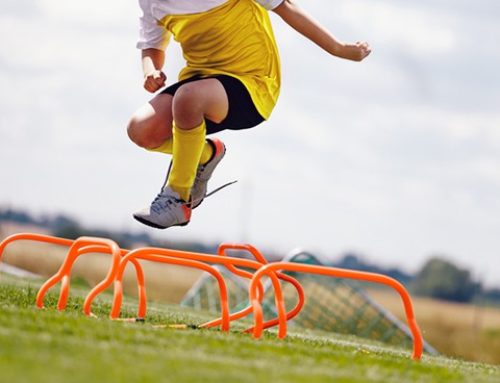The physical demands of soccer make drinking enough fluids incredibly important for players to optimize performance and enhance recovery. Playing conditions dictate specific nutritional needs, so players should understand their nutrition goals to make informed fluid choices.
Your overall performance is affected even by small fluid losses, as little as 2% of body weight. The body loses a significant amount of fluid from sweating. So if you play in areas of high temperature and humidity, you’ll probably need to drink more fluid. Sweat rate is also affected by exercise intensity, which is a fluid requirement factor across all player positions.
When selecting fluids, look for ones that contain sodium, such as sport drinks. These may help manage fluid losses by encouraging fluid retention.
Carbohydrates are another important nutrient for players. Carbs fuel muscle tissue during soccer activities and support high intensity aerobic and anaerobic activities for 90 minutes or more. Muscle glycogen, the storage form of carbohydrate, acts as a high-octane fuel for muscle tissue. Studies have shown that games make heavy demands on muscle glycogen stores, especially in midfield and running players. The issue is particularly important when games are played back to back, as in tournaments. Experts have suggested that inadequate fuel stores may impact soccer performance, leading to reductions in average running speed and ground covered, especially in the second half of practice and matches.
Finally, protein is important because it can enhance recovery after exercise. When ingested with adequate amount of carbohydrate, it increases the rate of glycogen synthesis to repair tissue damage and recover fuel stores for the upcoming soccer session. It is particularly vital when players have few breaks between soccer sessions, as in tournaments and split training days.
Protein-based fluids are best used in the recovery period. They assist with tissue repair and enhance glycogen repletion when ingested with carbohydrates. Although sports drinks with protein are available, players should consider expanding their recovery options to include nutrient dense beverages such as milk, shakes, fruit smoothies and liquid meal supplements.
Soccer players need to reflect on their nutrition goals to make informed fluid choices. Based on the need to manage dehydration and glycogen depletion, they should select fluid products that deliver water and carbohydrates to the body before and during exercise to optimize performance, and again after exercise to enhance recovery. Fortunately, athletes can incorporate a variety of fluid products in their hydration plan.
Check out STACK’s Hydration Guide for more ideas, suggestions and recipes for staying hydrated all season.
Photo: SMCGaels.com
RECOMMENDED FOR YOU
MOST POPULAR
The physical demands of soccer make drinking enough fluids incredibly important for players to optimize performance and enhance recovery. Playing conditions dictate specific nutritional needs, so players should understand their nutrition goals to make informed fluid choices.
Your overall performance is affected even by small fluid losses, as little as 2% of body weight. The body loses a significant amount of fluid from sweating. So if you play in areas of high temperature and humidity, you’ll probably need to drink more fluid. Sweat rate is also affected by exercise intensity, which is a fluid requirement factor across all player positions.
When selecting fluids, look for ones that contain sodium, such as sport drinks. These may help manage fluid losses by encouraging fluid retention.
Carbohydrates are another important nutrient for players. Carbs fuel muscle tissue during soccer activities and support high intensity aerobic and anaerobic activities for 90 minutes or more. Muscle glycogen, the storage form of carbohydrate, acts as a high-octane fuel for muscle tissue. Studies have shown that games make heavy demands on muscle glycogen stores, especially in midfield and running players. The issue is particularly important when games are played back to back, as in tournaments. Experts have suggested that inadequate fuel stores may impact soccer performance, leading to reductions in average running speed and ground covered, especially in the second half of practice and matches.
Finally, protein is important because it can enhance recovery after exercise. When ingested with adequate amount of carbohydrate, it increases the rate of glycogen synthesis to repair tissue damage and recover fuel stores for the upcoming soccer session. It is particularly vital when players have few breaks between soccer sessions, as in tournaments and split training days.
Protein-based fluids are best used in the recovery period. They assist with tissue repair and enhance glycogen repletion when ingested with carbohydrates. Although sports drinks with protein are available, players should consider expanding their recovery options to include nutrient dense beverages such as milk, shakes, fruit smoothies and liquid meal supplements.
Soccer players need to reflect on their nutrition goals to make informed fluid choices. Based on the need to manage dehydration and glycogen depletion, they should select fluid products that deliver water and carbohydrates to the body before and during exercise to optimize performance, and again after exercise to enhance recovery. Fortunately, athletes can incorporate a variety of fluid products in their hydration plan.
Check out STACK’s Hydration Guide for more ideas, suggestions and recipes for staying hydrated all season.
Photo: SMCGaels.com












